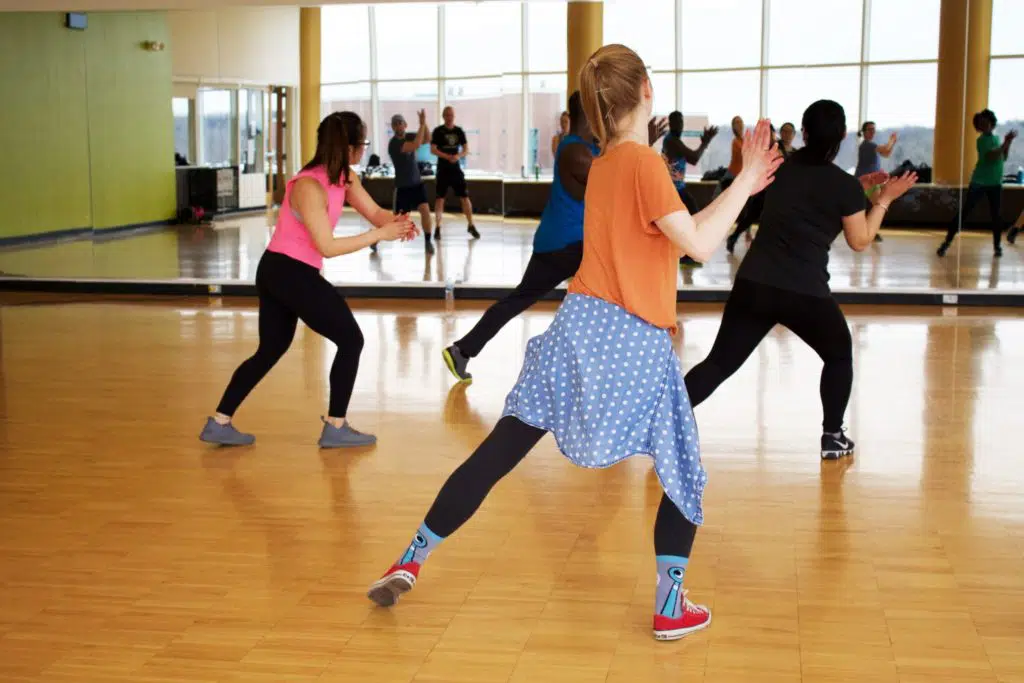If there is one part of my day I can’t do without, it’s my morning jog. It refreshes me and gets me in the right frame of mind to tackle the rest of the day. And it’s not just me; more and more people are becoming more conscious of their bodies and the need to stay fit.
Today, people scour the internet for tips on eating right and the best exercises. Anything that will help them realize their ideal fitness goals. Most people pick and choose whatever they find works best for them. And more often than not, it doesn’t work perfectly.
Right now, you’re thinking, “Okay, Sai. I get that people want to get fit. But what does that mean for me?”
Can I make a living out of it?”
While it may seem like a stretch, I promise that it’ll make more sense as you continue reading.
As of now, more and more people are realizing the value of fitness and a healthy lifestyle. This has lead to more opportunities opening up in this space.
Opportunities for who, you ask?
For someone like you. A Fitness Coach.
Today, there is a huge market for Fitness Coaches to make their own if they can market themselves well. According to a study published in 2017, 60.87 million Americans held gym memberships. You can be sure that a large chunk of that number barely steps foot in there after getting their memberships.
That’s because making a positive change, especially when it comes to your own health is difficult. This means, there are millions of people out there looking for help to meet their fitness goals. And you can help them as their Fitness Coach.
Yet, like with any industry, the fitness industry also has its share of competition. To make your mark in the industry, you need to make sure you stay informed upcoming trends and get certified.
Getting down to business, let’s have a look at a few basic questions about becoming a Fitness Coach.
In Brief : The Beginner’s Guide To Becoming A Fitness Coach
How Can You Become A Fitness Coach?
- Get Certified – Obtain a recognized fitness certification from organizations like ACE, NASM, ISSA, ACSM, or NSCA to instill trust and enhance your coaching credibility.
- Choose Your Speciality – Tailor your fitness career by deciding between one-on-one sessions or group classes, considering the pros and cons of each option.
- Put In Money – Allocate funds for certification, marketing, and potential travel expenses, understanding the financial investments necessary for your fitness coaching business.
- Learn. Refresh. Learn Some More – Stay updated on new research, technology, and insights in the fitness industry through reputable sources and social media to provide the best coaching to your clients.
- Decide Where You Want To Work – Choose between working at a gym or independently, considering factors like facility access, business limitations, and personal flexibility.
- Be Protected – Obtain insurance to safeguard against liability and potential claims, ensuring financial protection in case of accidents during training.
- Live By Your Own Words – Maintain your fitness and health, explore different workout trends, and seek knowledge from experienced coaches and health professionals to establish your coaching niche.
What Types Of People Hire A Fitness Coach?
- Manage Expectations – Set realistic, achievable goals for your fitness students, emphasizing gradual progress to keep them motivated and showcase tangible results.
- Understand How Habits Work – Recognize the challenge of breaking and forming habits, provide consistent support outside sessions, and tailor coaching approaches to individual interests for increased motivation.
- Something Will Work – Experiment with various locations, workout styles, and breaks to find the right combination that resonates with your student, ensuring continuous motivation and progress.
- Take A Little Help From Technology – Incorporate fitness trackers and technology to monitor progress, quantify efforts, and promote better habits among your students.
- Be Honest – Deliver honest feedback, even if it requires being firm, to guide students back on track, reminding them of their initial motivations and encouraging perseverance in their fitness journey.
What Most Fitness Coaches Don’t Get About Building A Business
- Reading The Contract – Thoroughly review and agree to the terms of any gym premises rental contract to avoid unexpected restrictions, ensuring it aligns with your business goals.
- Getting Paid – Acknowledge the business aspect of coaching, address payment matters professionally, and consider hiring a third party for financial transactions to maintain a positive coach-student relationship.
- Putting Yourself Out There – Leverage every encounter to market your coaching business, emphasizing the importance of online presence and considering professional website development to attract potential students.
- Financial Investment – Be prepared to invest in various aspects of your coaching business, covering expenses such as advertising, equipment, business cards, and office supplies as part of the initial financial commitment.
- Running The Actual Business – Embrace the need to understand business management aspects, seek mentorship to navigate areas like coaching bio, business model, client acquisition, and online presence, ensuring a holistic approach to your fitness coaching venture.
Who is a Fitness Coach?
While many may use the terms interchangeably, there is quite a big difference between a fitness coach and a personal trainer. A trainer focuses on the physical, while a coach is someone who sees the potential in you to do more. A Fitness Coach guides you towards it both physically and emotionally.
This means you’re responsible for more than pushing your students towards their fitness goals. You also need to understand them and make an investment in them. It is your responsibility to help them become the best they can be.
It goes without saying, but a Fitness Coach needs to be physically fit, and for more reasons that you think. Not only do you require the strength and stamina, but you also become a walking billboard for your abilities and knowledge.
Most importantly, as a Fitness Coach, you need to be able to motivate your students to stick to their fitness regimes. And that, let me tell you, is the hardest and yet most rewarding job of them all.
How can you become a Fitness Coach?
Before you take your first step towards becoming a Fitness Coach, it is important to look inwards and assess your physical fitness levels. You need to get yourself in peak condition, no matter how much time it takes.
So make sure you do your research on various healthy foods, experiment with workout regimes, anything that will help you become the best you can be. Also ensure that you work on your weak areas to improve the quality of your coaching. After all, you’ll be the example your students will follow.
Here are a few steps to help you on your way to becoming a Fitness Coach:
1. Get certified
A certification is more than a piece of paper that allows you to coach people. While it is not mandatory, it puts people at ease to see that you have a formal certification and makes them trust your judgment.
There are many different organizations that offer certifications for the fitness industry. Before you choose one, it’s important that you do your research to find a certification that is right for your career goals.
To get started, here are a few you can check out:
● American Council on Exercise (ACE)
● National Academy of Sports Medicine (NASM)
● International Sports Sciences Association (ISSA)
● American College of Sports Medicine (ACSM)
● National Strength and Conditioning Association (NSCA)
2. Choose your speciality
There are a lot of ways you can approach your fitness career. You could do one-on-one classes with your students for more personal and focused classes. Or you could have 15 people in a room together, all ready to sweat it out at your command. It all depends on what coaching niche works best for you.
Whatever you choose, be aware of the pros and cons involved. Larger classes will need a larger space, but one-on-one classes could also limit your earning potential. Make sure you choose a path that’s best suited to your career goals.
3. Put in money
Like every other business, to make money you’ll need to invest money. Apart from the certification itself, you will also need to invest money in marketing yourself. While a good word-of-mouth is the best way to move forward as you begin, soon you will reach a point where it’s not enough.
A cost that most people forget is travelling costs if you decide to offer personal training sessions at your student’s home. That, as well as the time spent travelling, should both be accounted for when you calculate your possible expenses.
4. Learn. Refresh. Learn some more
New research, new technology, new insights. Everything that you think you may know is constantly changing. This means it is your responsibility to stay on top of these trends and provide your students with the best possible fitness regime for them.
Let me warn you, it’s going to be time-consuming. Make sure you follow a few leading fitness websites, such as On The Regimen, Summer Tomato or Examine.com, keeping up isn’t as hard as you think it’s going to be. You can follow them on their respective Facebook, Twitter and Instagram pages as well. This will give you a good idea on what to include in your own social media pages.
Talk to the people around you – people who eat healthy, fitness fanatics, the Cross-Fit trainers – they may have ideas that you could use to improve your offering to your students.
5. Decide where you want to work
Now you probably don’t have big sacks of cash lying around that you can invest into your own gym. This raises the question – where are you going to work from? You could choose to work for a gym, or you could work as an independent Personal Fitness Coach.
Both have their own pros and cons. Many gyms allow you to rent time to use the facilities, which means you have a wider range of training types you can offer. The gym also gives you the best place to meet prospective students and grow your business.
Yet, gyms may have restrictive contracts and times, which could limit your business. This, in turn, will limit the flexibility you could offer your students.
Working on your own means you will need to find ways to build your own student base and be limited by what you can offer to your students in terms of workouts. However, it gives you the flexibility to create your own schedule, work on your own time and be your own boss.
6. Be protected
Accidents happen, especially when you’re in the middle of a strenuous workout. That’s why it’s important that, even before you start training anyone, you get insurance. This will protect you from any liability, and in case there are claims, it covers you against them as well.
7. Live by your own words
Like I mentioned earlier, as a Fitness Coach, it is important that you stay fit as well. Your students will look up to you as their fitness role model, and you’ll also be able to confidently lead them through workouts without difficulty.
Another thing you need to do is explore. Don’t ignore any new arc of the fitness circle. Try yoga, CrossFit and anything else that comes up. Because the more you know, the better you’ll be able to help your students reach their fitness goals.
And last, but not the least, talk to people. Talk to experienced coaches, health professionals, and workout with various trainers. The more knowledge you accumulate early on, the easier it will be to find your own coaching niche.
What types of people hire a Fitness Coach?
Today, as a society, we are shifting towards a healthier way of life; not just physically, but emotionally as well. People are eating healthier, they are taking time off for themselves from work, going for jogs. But if that was the case, wouldn’t see more people jogging than just talking about jogging?
If getting active and staying healthy was easy, you would see a lot more people doing it. But the reality of the matter is that its hard work, and like anything difficult, a lot of people don’t have the motivation to see it through.
And that’s why they hire you, their Fitness Coach. Because they want to be better versions of themselves, but need someone to push them to get there. It’s easy to sweat it out with your students, but making sure they stick to their regime is where the real work comes in. Sometimes for your clients to see real results, you might even have to do a complete overhaul of their life and habits.
Whether it be time management, a stressful job, or family life, there are always reasons that keep people from getting up and working out. It’s your job to help them break through these barriers and build good habits.
Here are a few tips that can help you push your students towards their better self.
1. Manage expectations
Never promise your students miracles or unrealistic goals. By giving them small, manageable goals, you will be able to show them proof of their progress as they meet every objective. This will motivate them to keep pushing themselves further because they can see the results
2. Understand how habits work
Habits are as difficult to break out of as they are to get into. Your students will need all the help and motivation keep them from slipping back into their laziness. Contact them even when you’re not in a session so they know you’re keeping track of their progress.
Apart from ensuring that your students develop good habits, you need to have the right habits to be a successful coach as well.
You can also personalize coaching packages based on an individual’s interest to give them a further incentive for sticking with it. So if someone loves nature, running outside in the greenery would work much better than lifting weights indoors.
3. Something will work
There is a whole, wide world out there. If your student is finding it difficult to find the motivation to get fit, then experiment! Try different locations, different coaching styles of workouts, or even just take a break from the regime for a couple of days and head to the beach for a swim.
There is a way to get anyone out of a rut. And the more you try, the closer you get to finding the right combination that will keep your student motivated and driven towards achieving their fitness goals.
4. Take a little help from technology
Today, technology is deeply ingrained in our lives. And it can be a huge benefit when it comes to health and fitness. Encourage your students to use a fitness tracker so you can track their progress, while also quantifying their efforts to help build better habits.
5. Be honest
Sometimes, the truth hurts. You will find yourself in situations where you will have to be hard on a student, if only for their own good. If they are lagging behind on their fitness goals, it is your responsibility to bring them back on track.
The only thing that will help is honesty. Tell them, truthfully, the effects of slacking off. Remind them why they started on this journey in the first place. Giving up is easy, so make sure you’re there to always push them that extra mile whenever they think of doing so.
What is your role as a Fitness Coach?
As a Fitness Coach, your role is to help your students achieve their fitness goals. But unlike a Fitness trainer, your role goes above and beyond their physical fitness.
It is your responsibility to assess their lifestyle, and help them make the necessary changes. You are their trusted advisor when it comes to health. You are their guide towards learning how to nourish their body, mind and soul.
That’s why, besides nutrition and fitness, you as a coach need to explore anything that may have a negative effect on their lives. This could be habits, environmental or even relationships.
The truth about Fitness Coaching
If you’re passionate about health and fitness, becoming a fitness coach is an easy career choice. Yet, there is more to becoming a successful Fitness Coach than working out with your students.
The actual coaching session is the easy part. Before the session comes hours and days of training and research. And even some time spent perfecting that workout playlist.
A fitness coach also needs to spend quality time learning about the science behind the body. Keeping all these in mind, being a fitness coach requires a lot of hard work and dedication.
No matter how much you love a good workout, there a LOT of people who don’t. That is exactly why they need you. You need to be their own personal cheerleader to break the lethargy barrier. This is one of the most important aspects of becoming a fitness coach.
You need to be able to understand your students’ mindset and figure out the best way you can motivate them. And what works for one student may not work for another.
Find a balance between what works for the student and your style of coaching. This is going to be vital to the success of your coaching business.
This last thing I tell you may feel like a no-brainer, but you will not believe how many people forget this. Holidays are your biggest season. This means, while everyone else is free, you need to be with a client going over their holiday meal plan. You can even include discounts for your holiday coaching packages.
Becoming a Fitness Coach is a very rewarding experience, and a great way to develop unique friendships.
What most Fitness Coaches don’t get about building a business
Your Fitness Coaching business is just like any other business in the service industry. This means every problem a small-sized business faces, you probably will too. But instead of learning it the hard way, you can continue reading and avoid a few of them if you can.
1. Reading the contract
If you decide to “rent” gym premises for your classes, make sure you read and agree with every point that’s mentioned in the contract. Realizing you can’t take students after 8 PM can really damage your profits.
2. Getting Paid
When you create a unique relationship with your students, asking for money can seem cold and too business-like. But don’t forget that you ARE running a business. If you don’t want to deal with it directly, hire a third-party who will collect the money instead
3. Putting yourself out there
Everywhere you go, everyone, you meet offers an opportunity to market yourself. Don’t hesitate to mention your business in passing, because good old word-of-mouth can get you a far, even today.
But then again, word-of-mouth will also only take you so far. In today’s time, if a student can’t find your website online, you’ve already lost their prospective business. If you can’t do it, hire someone else to build it for you because that’s the best way to funnel in students.
4. Financial investment
When you start off, you will have to pay for the costs from your own pockets. So you’ll be spending money on everything from advertising and equipment to business cards and office supplies.
5. Running the actual business
Your passion for helping people reach their fitness goals is why you want to become a Fitness Coach. But becoming one also means that you learn the ins and outs of managing a business. It would help immensely if you could take on a mentor who will help you with things like your coaching bio, business model, getting the right type of clients, setting up your online presence etc.
How to build a successful fitness coaching business?
Becoming a successful Fitness Coach requires getting more than a certification. Getting students and retaining them depends not only on how well you train your students but also how well you understand them because that’s how you create a bond with them.
And sometimes, it’s the little things that count. So drop a message to make sure your students are keeping up their fitness regime outside of sessions. It not only will help you keep them motivated, but will also show that you care.
You can even offer printouts of workouts and meal plans they can follow at home. If your students like reading, share a few articles on health and fitness with them.
When they do come for a session, make sure listen. That’s so you can adjust their workout depending on how they feel that day. And by giving students regular assessments, you can further modify the regime to help them effectively get towards the results they want.
Frequently Asked Questions (FAQs)
What is a fitness coach?
A fitness coach is a trained professional in the field of fitness, weight loss and body shaping. There are various specializations in the field of fitness, but generally speaking a Fitness coach is responsible for creating and executing the fitness level of a client. This may or may not include actual physical training.
What does a fitness coach do?
A fitness coach is a person who is hired to improve your physical health and overall fitness. The services of a fitness coach can be beneficial to patients who are recovering from an injury, to people who are trying to lose weight and to women who are pregnant. The job of a fitness coach includes guiding and encouraging the client through different exercises and training techniques to help the client achieve his full fitness potential. The fitness trainer also performs routine health checks on the client and directs him to the right channel if he needs to be treated by a medical professional.
Who needs a fitness coach?
If you want to achieve specific results, you will need help from an experienced coach. A professional trainer will help you build a workout program that is most effective for your goals. Your success in attaining your goal is dependent on your willingness to apply the principles and techniques you learned from your coach. If you don’t have the time or the patience to commit to a regular workout, then you should consider hiring a personal trainer. A good personal trainer will help you set realistic goals and work out a training program that will help you see results in a safe and healthy manner. You may even save time and money by training one-on-one with a personal trainer.
How to become a fitness coach?
The first step to becoming a fitness coach is finding a mentor. That mentor may be another fitness coach, a professional athlete, or even someone who is already successful in their own weight loss. This will be the person who helps guide you and the person you can look to for advice. For example, my mentor and I have a mentor-apprentice relationship. I am the apprentice and she is the mentor. We meet for dinner several times a month and she offers me guidance and advice. She also checks my training programs and lets me know if something doesn’t seem quite right. You want to find a person who will take you under their wing and teach you everything you need to know about being a personal trainer.
How to build a successful career in fitness coaching?
A career in fitness, especially as a career in fitness coaching, is something that allows you to get a lot of satisfaction. There’s nothing more rewarding than helping others improve their health, their energy, and their bodies. But, it’s important to understand that this is not a money making venture. It’s a very satisfying vocation, but it’s not a way to get rich. If you go into it with the idea that you’ll be rich in no time, you’re going to be disappointed.













Your blog is very nice. These tools are really very helpful…:-)